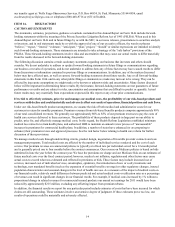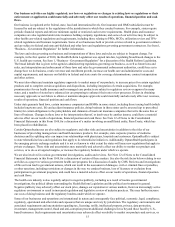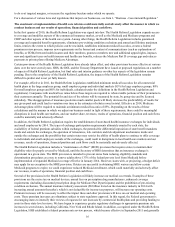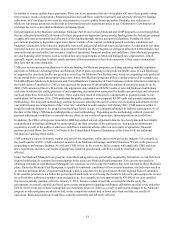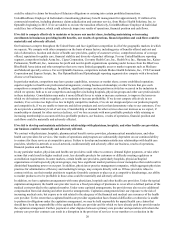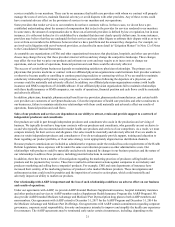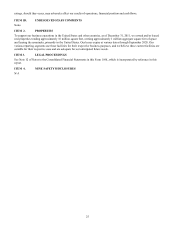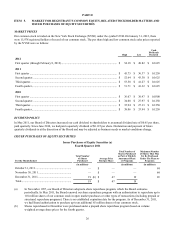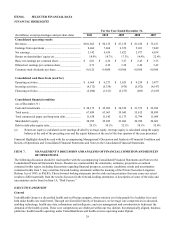United Healthcare 2011 Annual Report Download - page 25
Download and view the complete annual report
Please find page 25 of the 2011 United Healthcare annual report below. You can navigate through the pages in the report by either clicking on the pages listed below, or by using the keyword search tool below to find specific information within the annual report.23
adversely affect our investment income. In addition, a delay in payment of principal and/or interest by issuers, or defaults by
issuers (primarily from investments in corporate and municipal bonds), could reduce our net investment income and we may be
required to write down the value of our investments, which would materially and adversely affect our profitability and
shareholders' equity.
We also allocate a small proportion of our portfolio to equity investments, which are subject to greater volatility than fixed
income investments. General economic conditions, stock market conditions, and many other factors beyond our control can
materially and adversely affect the value of our equity investments and may result in investment losses.
There can be no assurance that our investments will produce total positive returns or that we will not sell investments at prices
that are less than their carrying values. Changes in the value of our investment assets, as a result of interest rate fluctuations,
changes in issuer financial conditions, illiquidity or otherwise, could have an adverse effect on our shareholders' equity. In
addition, if it became necessary for us to liquidate our investment portfolio on an accelerated basis, it could have a material
adverse effect on our results of operations and the capital position of regulated subsidiaries.
If the value of our intangible assets is materially impaired, our results of operations, shareholders' equity and debt
ratings could be materially and adversely affected.
Goodwill and other intangible assets were $26.8 billion as of December 31, 2011, representing 39% of our total assets. We
periodically evaluate our goodwill and other intangible assets to determine whether all or a portion of their carrying values may
be impaired, in which case a charge to earnings may be necessary. For example, the manner in or the extent to which the Health
Reform Legislation is implemented may impact our ability to maintain the value of our goodwill and other intangible assets in
our business. Similarly, the value of our goodwill may be materially and adversely impacted if businesses that we acquire
perform in a manner that is inconsistent with our assumptions. In addition, from time to time we divest businesses, and any
such divestiture could result in significant asset impairment and disposition charges, including those related to goodwill and
other intangible assets. Any future evaluations requiring an impairment of our goodwill and other intangible assets could
materially and adversely affect our results of operations and shareholders' equity in the period in which the impairment occurs.
A material decrease in shareholders' equity could, in turn, adversely impact our debt ratings or potentially impact our
compliance with existing debt covenants.
Large-scale medical emergencies may result in significant medical costs and may have a material adverse effect on our
results of operations, financial position and cash flows.
Large-scale medical emergencies can take many forms and can cause widespread illness and death. Such emergencies could
materially and adversely affect the U.S. economy in general and the health care industry specifically. For example, in the event
of a natural disaster, bioterrorism attack, pandemic or other extreme events, we could face, among other things, significant
medical costs and increased use of health care services. Any such disaster or similar event could have a material adverse effect
on our results of operations, financial position and cash flows.
If we fail to properly maintain the integrity or availability of our data or to strategically implement new or upgrade or
consolidate existing information systems, or if our technology products do not operate as intended, our business could
be materially and adversely affected.
Our ability to adequately price our products and services, to provide effective service to our customers in an efficient and
uninterrupted fashion, and to accurately report our results of operations depends on the integrity of the data in our information
systems. As a result of technology initiatives and recently enacted regulations, changes in our system platforms and integration
of new business acquisitions, we have been consolidating and integrating the number of systems we operate and have upgraded
and expanded our information systems capabilities. Our information systems require an ongoing commitment of significant
resources to maintain, protect and enhance existing systems and develop new systems to keep pace with continuing changes in
information processing technology, evolving systems and regulatory standards, emerging cybersecurity risks and threats, and
changing customer patterns. If the information we rely upon to run our businesses was found to be inaccurate or unreliable or if
we fail to maintain or protect our information systems and data integrity effectively, we could lose existing customers, have
difficulty attracting new customers, have problems in determining medical cost estimates and establishing appropriate pricing,
have difficulty preventing, detecting and controlling fraud, have disputes with customers, physicians and other health care
professionals, have regulatory sanctions or penalties imposed, have increases in operating expenses or suffer other adverse
consequences. There can be no assurance that our process of consolidating the number of systems we operate, upgrading and
expanding our information systems capabilities, protecting our systems against cybersecurity risks and threats, enhancing our
systems and developing new systems to keep pace with continuing changes in information processing technology will be
successful or that additional systems issues will not arise in the future. Failure to protect, consolidate and integrate our systems
successfully could result in higher than expected costs and diversion of management's time and energy, which could materially
and adversely affect our results of operations, financial position and cash flows.
Certain of our businesses sell and install hardware and software products, and these products may contain unexpected design



